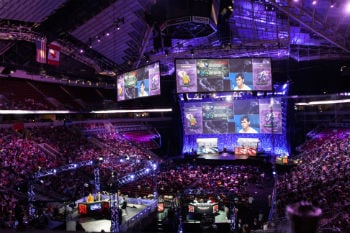eSports
The Dawn of eSports
Sporting jeans and hoodies, and barely out of college, the rising stars of eSports gaming are set to forever change the landscape. Gone are the times when gaming was considered a mere hobby and nothing else that would reap fame or fortune.

With tournaments as grand as that of football's and baseball's, the industry is poised to grow into a billion-dollar one, with fans and participants from all across the world. But what is it and how did it come to being?
What Are eSports?
In a nutshell, it's sports competitions that revolve around video games. Players take to the digital space to battle it out instead of in glossily-buffered basketball courts or grass-treated soccer fields. Different game genres like MOBAs and MMORPGs are the main focus of eSports tournaments. Ironically, sports-themed games like Fifa and Madden remain bottom feeders over games like League of Legends and Dota 2.
eSports encompasses both team-based and player-based competitions. Some games like League of Legends require a 5-man team for you to even join the qualifiers. Games like Tekken, on the other hand, only require a solo act.
While organized online and offline events are not a new concept in the video game culture, the scale of spectatorship and the splendor of prizes and venues have significantly increased since the turn of the 21st century, ultimately spurring participation of professional players and teams.
Where Did eSports Begin?
Although there is no specific location where eSports competitions began, its roots originate from developed countries in Europe and Asia, such as Germany and South Korea. The latter, in fact, has one of the most well-recognized eSports programs and organizations today. These organizations have been licensing professional gamers, also known as cyber athletes, since 2000.
Today, most tournaments take place in Europe, China, and the United States. Japan is also a common venue, yet eSports in the country remains underdeveloped despite its massive video gaming industry and its technologically advanced economy.
Perhaps a key factor weighing down on Japan's pace of advancement in the eSports business is its stringent and broad anti-gambling regulations.
What Games Does eSports Encompass?
There are different game genres that are played under eSports events. Fighting and arcade games, for example, are popular genres for amateur competitions. The more apparent ones, however, are MOBAs, short for multiplayer online battle arenas. Games like Dota 2 and League of Legends have major and minor events that are held on a weekly or monthly basis.
Premier tournaments are held by the game's publishers and usually award larger prize pools than amateur and minor competitions. Last year, in fact, Dota 2's The International 2015 tournament awarded more than $18 million to its winning team. First-person shooter game, Counter-Strike: Global Offensive, is another noteworthy game that's hot on the eSports scene.
How Lucrative is a Career in eSports?
While cyber athletes are yet to make the same ludicrous paychecks that top athletes make in their respective sports, eSports as a career is a potentially lucrative one if you are on the right game genre and team.
It's not unusual to make more than $100,000 in winnings on a major league tournament. And considering that professional players and teams can play multiple times per year, these winnings can further increase to massive sums.
Of course, success in eSports do not come without some sacrifices. Professional players and teams train nonstop to be the best in their line of work. Countless hours are spent every week spamming pub matches and rehearsing team combos. Most professional teams even have their own training camp complete with housing and coaches.
